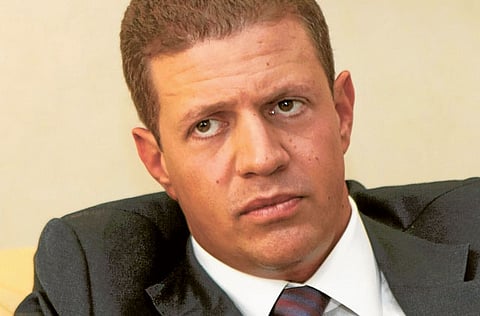Sharjah gas supply arbitration next year
Delay in delivery of Iranian fuel to Crescent Petroleum is hampering growth and industrial investment in emirate

Dubai: International arbitration sought by Crescent Petroleum, the multi-billion dollar Sharjah-based diversified upstream energy exploration company, against the National Iranian Oil Company (NIOC) for losses incurred by its failure to supply to Sharjah the amounts of gas agreed upon, is expected to be resolved in February 2012, Gulf News has learnt.
"The International Arbitration Tribunal in The Hague will deliver their decision in February next year, which is binding on both parties," Majid H. Jafar, Chief Executive Officer of Crescent Petroleum, told Gulf News in an exclusive interview.
Crescent Petroleum and NIOC entered into a contract in 2001 to supply 500 million cubic feet of Iranian gas per day to Sharjah through a pipeline with deliveries due to have commenced in December 2005.
Accordingly, Crescent invested and built its pipeline and associated transport infrastructure for the supply of gas, mostly to the Sharjah Electricity and Water Authority (Sewa), Federal Electricity and Water Authority (Fewa) and some private companies.
However, there were technical delays by NIOC in completing its upstream supply facilities, though it completed the 280-kilometre pipeline to transport gas across the Gulf in 2006, Jafar said. Then in 2009, Crescent filed for international arbitration to seek a solution to the deadlocked deal.
Protection of clients
"We had to seek international arbitration to protect the interests of our clients and the losses suffered by the stakeholders in the deal from the UAE side after years of delay," Jafar said.
"However, following the arbitration filing, we have received encouraging signs from NIOC and in July last year the company supplied limited quantities of gas to Sharjah for testing purposes. Subsequently, however, they discovered leaks in their pipeline that halted the commercial supply of the gas."
The delay in delivery of the gas is hampering the economic growth and industrial investment in the northern emirates. Last year's power cuts in parts of Sharjah during summer are still fresh in people's minds.
Although the UAE is energy rich, the country is heavily reliant on imported gas. The Abu Dhabi Government's investment arm Mubadala has led a consortium under the Dolphin project to bring Qatari gas to the UAE, a large chunk of which is being used by Dubai's power plants.
Oil and gas sectors in the Gulf are still well guarded economic areas, usually controlled by government-owned entities, with very limited access to the private sector.
The 40-year-old Crescent Petroleum is the largest private energy venture in the GCC that is trying to explore, produce and trade energy to meet the rising gap between demand and supply.
The company last year established a joint venture with Russian state-owned energy giant Rosneft to pursue energy opportunities in the Middle East. Later, Rosneft joined Crescent in a concession from the Sharjah government to explore for oil and gas in a 1,200-square kilometre onshore area. "We have already invested $35 million in the field of drilling and exploration activities. We are optimistic and hope to deliver some good results in future," Jafar said.
Energy security is a major concern for emerging economies that are witnessing higher economic growth.
India, China, Brazil and Russia as well as the developed economies are currently trying to secure additional energy supplies to power these economies.
The GCC, Iraq and Iran collectively hold 40 per cent of the global gas reserves and 60 per cent of the world's proven oil reserves and remains the biggest source of energy for the rest of the world.
According to Arab Petroleum Investment Corporation (Apicorp), the region is expected to invest about $200 billion in the next 20 years in oil and gas alone.
The UAE — the second biggest Arab economy — is expected to grow at a faster pace in the next few years, when large petrochemical industries and downstream activities pick up in Abu Dhabi and the rest of the country.
Uninterrupted and safe energy supplies would remain a major concern for all.
The Abu Dhabi government is investing heavily in developing mid-stream and downstream petrochemical industries to create a complete value chain for these oil-based industries.
Despite the rising demand and limited imports, the UAE is well placed in its quest for energy security, Jafar says.
"The development of deeper gas reserves in Abu Dhabi as well as the renewable energy ventures through Masdar and the nuclear and coal power initiatives will complement the gas import projects and local petroleum production to create the right energy mix for the country in the future," he said.
Right direction
"That way, the country is heading in the right direction, though energy demand policies are also required. However, Crescent did not limit its activities in the UAE. Crescent and its affiliate, Dana Gas, have partnered with global players to develop a Gas City in Iraq's Kurdistan, Egypt and there is a plan to set up one in Yemen. Due to the political changes, the Egyptian and Yemeni projects are facing certain delays.
"However, our project in Kurdistan is going ahead very well. We are currently producing 60,000 barrels equivalent of oil and gas that are powering utilities in Kurdistan — a better managed part of Iraq that is attracting foreign investment," Jafar said.
"We have already invested $850 million in the project and there are fresh investments being made to expand the facility."
Jafar's father, Hamid Jafar — a UAE businessman of Iraqi origin — established Crescent Petroleum 40 years ago with the blessing of the Sharjah Government to develop local oil and gas resources in the region — where oil and gas largely remains a government business. "We have always focused on a local approach and long-term relationships to support the local economies in which we work," he says.



